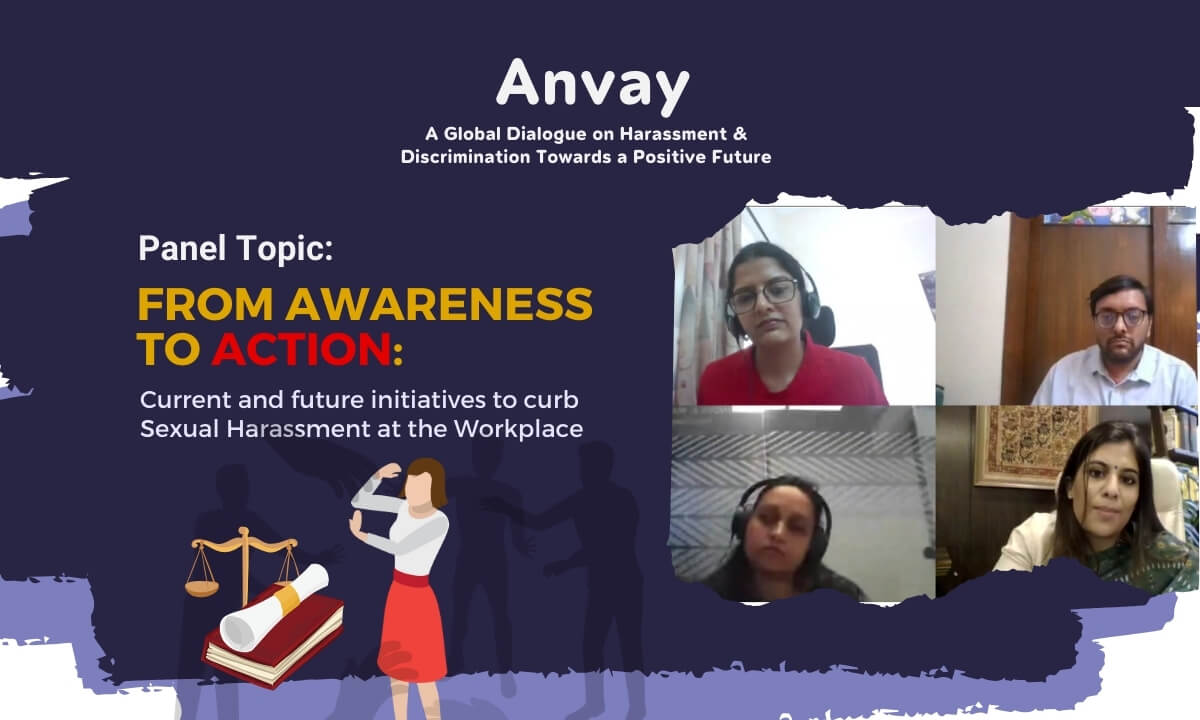At Anvay, the panel discussion “From Awareness to Action: Current and future initiatives to curb Sexual Harassment at the Workplace,” featured expert discussions on harassment and discrimination, with the goal of raising awareness and fostering meaningful conversations around these critical issues.
The panel featured insightful contributions from:
- Mitakshara Goyal, Co-Founder, Svarniti Law Offices.
- Prakash Gupta, Lead, Platform Economy and Future of Work.
- Nikita Doshi, Senior Manager People Success, Publicis Sapient.
- Noopur Singhal, Social Activist and Local Committee Chairperson.
The panelists discussed the evolving best practices adopted by mature companies and initiatives that not only foster inclusivity but also create an environment where individuals feel safe to report harassment without fear of consequences.
Progress in Awareness and Engagement
- Awareness Levels: Efforts to raise awareness about the POSH Act have gained momentum, particularly in urban areas.
- Engagement with NGOs: Collaborative initiatives involving district officers and NGOs are beginning to bridge the gaps in understanding and reporting mechanisms in the unorganized sector.
- Fostering Awareness: This grassroots approach is crucial for fostering a culture of awareness, especially where traditional channels may be lacking.
Platform Economy and Gender Issues
- Nature of Platform Work: The platform economy includes gig workers in roles like cab driving and food delivery, which are predominantly male-dominated.
- Safety Concerns: Women face unique safety challenges in non-office-based roles, which can deter participation in the platform economy.
- SOS Mechanisms: Some companies have introduced SOS buttons for gig workers to report emergencies, and policies are being extended to protect these workers.
Evolving Company Practices
- Maturity Levels: Organizations are increasingly recognizing the importance of not just compliance but also creating an inclusive workplace.
- Gender-Neutral Policies: The adoption of gender-neutral policies reflects a progressive shift that acknowledges the diverse experiences of all employees, including men and transgender individuals.
- Non-Retaliation and Confidentiality: Companies that prioritize non-retaliation and confidentiality are fostering an environment where employees feel safe to report harassment without fear of consequences.
Raising Awareness through Training
- Innovative Training Methods: Companies must move beyond traditional webinars by incorporating role-play and real-life scenarios that resonate with employees and focused discussions to enhance understanding of harassment. This hands-on approach enhances understanding and empathy, making discussions about harassment more relatable.
- Cultural Sensitivity: Including training addressing issues faced by under-represented communities, including those with disabilities and LGBTQI+ individuals.
- Leadership Involvement: Continuous communication from leadership is essential in setting the tone for a supportive culture, encouraging open dialogue about harassment and safety.
The insights shared by experts highlight the importance of moving from awareness to actionable initiatives that not only comply with legal frameworks but also create a culture of respect and support.
As we strive for a more equitable and just society, it is imperative that all stakeholders—companies, policymakers, and advocates—collaborate to implement comprehensive strategies that address harassment in all its forms.
This collective effort will not only enhance workplace safety but also contribute to the broader goal of social justice, ensuring that every individual feels valued and respected in their professional environment.
Together, we can pave the way for a future where workplaces are truly free from harassment and discrimination, fostering a culture of inclusivity and empowerment for all.
Authored by Gomathi Sridevi Radhakrishnan, Content Writer Intern, The Legal Swan


